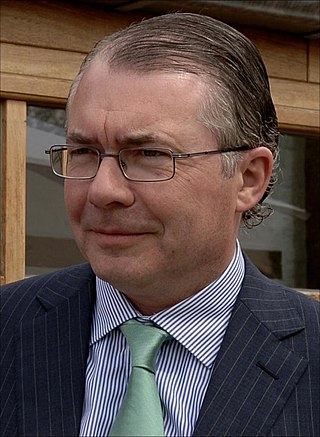
Diego Portales University is one of the first private universities founded in Chile and is named after the Chilean statesman Diego Portales.

Health informatics is the study and implementation of computer structures and algorithms to improve communication, understanding, and management of medical information. It can be viewed as branch of engineering and applied science.

The National Institute for Health and Care Excellence (NICE) is an executive non-departmental public body, in England, of the Department of Health and Social Care, that publishes guidelines in four areas:

Heinrich Heine University Düsseldorf, named after German poet Heinrich Heine, is a public university in North Rhine-Westphalia, Germany, which was founded in 1965. It is the successor organization to Düsseldorf's Medical Academy of 1907.

The Agency for Healthcare Research and Quality is one of twelve agencies within the United States Department of Health and Human Services (HHS). The agency is headquartered in North Bethesda, Maryland, a suburb of Washington, D.C.. It was established as the Agency for Health Care Policy and Research (AHCPR) in 1989 as a constituent unit of the Public Health Service (PHS) to enhance the quality, appropriateness, and effectiveness of health care services and access to care by conducting and supporting research, demonstration projects, and evaluations; developing guidelines; and disseminating information on health care services and delivery systems.
An informationist provides research and knowledge management services in the context of clinical care or biomedical research.

The Joint Research Centre (JRC) is the European Commission's science and knowledge service which employs scientists to carry out research in order to provide independent scientific advice and support to European Union (EU) policy.

The Medical University of Gdańsk is the largest medical academic institution in northern Poland. It educates more than 5000 undergraduate and postgraduate students in four faculties.
Translational medicine develops the clinical practice applications of the basic science aspects of the biomedical sciences; that is, it translates basic science to applied science in medical practice. It is defined by the European Society for Translational Medicine as "an interdisciplinary branch of the biomedical field supported by three main pillars: benchside, bedside, and community". The goal of translational medicine is to combine disciplines, resources, expertise, and techniques within these pillars to promote enhancements in prevention, diagnosis, and therapies. Accordingly, translational medicine is a highly interdisciplinary field, the primary goal of which is to coalesce assets of various natures within the individual pillars in order to improve the global healthcare system significantly.

The Academy of Medical Sciences is an organisation established in the UK in 1998. It is one of the four UK National Academies, the others being the British Academy, the Royal Academy of Engineering and the Royal Society.
The National Health and Medical Research Council (NHMRC) is the main statutory authority of the Australian Government responsible for medical research. It was the eighth largest research funding body in the world in 2016, and NHMRC-funded research is globally recognised for its high quality. Around 45% of all Australian medical research from 2008–12 was funded by the federal government, through the NHMRC.

Professor Emeritus Georges J. E. De Moor is a Belgian Medical Doctor, Clinical Pathologist and has been head of the Department of Health Informatics and Medical Statistics of the University of Ghent (Ghent).
The National Institute for Health and Care Research (NIHR) is the British government’s major funder of clinical, public health, social care and translational research. With a budget of over £1.2 billion in 2020–21, its mission is to "improve the health and wealth of the nation through research". The NIHR was established in 2006 under the government's Best Research for Best Health strategy, and is funded by the Department of Health and Social Care. As a research funder and research partner of the NHS, public health and social care, the NIHR complements the work of the Medical Research Council. NIHR focuses on translational research, clinical research and applied health and social care research.

The Finnish Institute for Health and Welfare is a Finnish research and development institute operating under the Ministry of Social Affairs and Health. THL was formed on 1 January 2009, with the merger of the National Public Health Institute of Finland (KTL) and the National Research and Development Centre for Welfare and Health. It is the biggest expert organisation under the ministry and its most important source of consultation regarding scientific knowledge.
NHS Evidence was a government-funded resource in the United Kingdom that supplied information, research, evidence and best practice guidance for health, social care and public health. It was archived in 2009 as part of NHS Evidence - National Library for Public Health, formerly a Specialist Library of the National Library for Health. NHS Evidence Health Information Resources existed to support clinicians by providing access to the best possible knowledge and know-how available. NHS Evidence was a service provided by the UK National Institute for Healthcare Excellence (NICE).

Healthcare in Belgium is composed of three parts. Firstly there is a primarily publicly funded healthcare and social security service run by the federal government, which organises and regulates healthcare; independent private/public practitioners, university/semi-private hospitals and care institutions. There are a few private hospitals. Secondly is the insurance coverage provided for patients. Finally, industry coverage; which covers the production and distribution of healthcare products for research and development. The primary aspect of this research is done in universities and hospitals.
The European Federation of Periodontology (EFP) is a non-profit organisation dedicated to promoting awareness of periodontal science – the science and clinical practice of periodontics and implant dentistry – and the importance of gum health. Its guiding vision is “Periodontal health for a better life.”

The NIH Intramural Research Program (IRP) is the internal research program of the National Institutes of Health (NIH), known for its synergistic approach to biomedical science. With 1,200 Principal Investigators and over 4,000 Postdoctoral Fellows conducting basic, translational, and clinical research, the NIH Intramural Research Program is the largest biomedical research institution on earth. The unique funding environment of the IRP facilitates opportunities to conduct both long-term and high-impact science that would otherwise be difficult to undertake. With rigorous external reviews ensuring that only the most outstanding research secures funding, the IRP is responsible for many scientific accomplishments, including the discovery of fluoride to prevent tooth decay, the use of lithium to manage bipolar disorder, and the creation of vaccines against hepatitis, Hemophilus influenzae (Hib), and human papillomavirus (HPV). In addition, the IRP has also produced or trained 21 Nobel Prize-winning scientists.

Sciensano is a research institute and the national public health institute of Belgium. It is a so-called federal scientific institution that operates under the authority of the federal minister of Public Health and the federal minister of Agriculture of Belgium. Sciensano's core business is scientific research in the fields of public health, animal health and food safety. Sciensano arose in 2018 from the merger of the former Veterinary and Agrochemical Research Centre and the former Scientific Institute of Public Health. Both institutions were merged because of their complementary activities and to be able to provide a comprehensive answer to the health challenges of the future. More particularly, the merger was based on the One Health principle that states that the areas of human health, animal health and the environment are inherently connected with each other. The merger became official on April 1, 2018.
The National Institute for Health and Disability Insurance (NIHDI) is a federal public body of social security in Belgium. Under the authority of the Belgian federal minister of Social Affairs and Public Health, it is responsible for administering the country's compulsory national schemes for health insurance and disability benefits, and manages a compensation fund for medical accidents.












